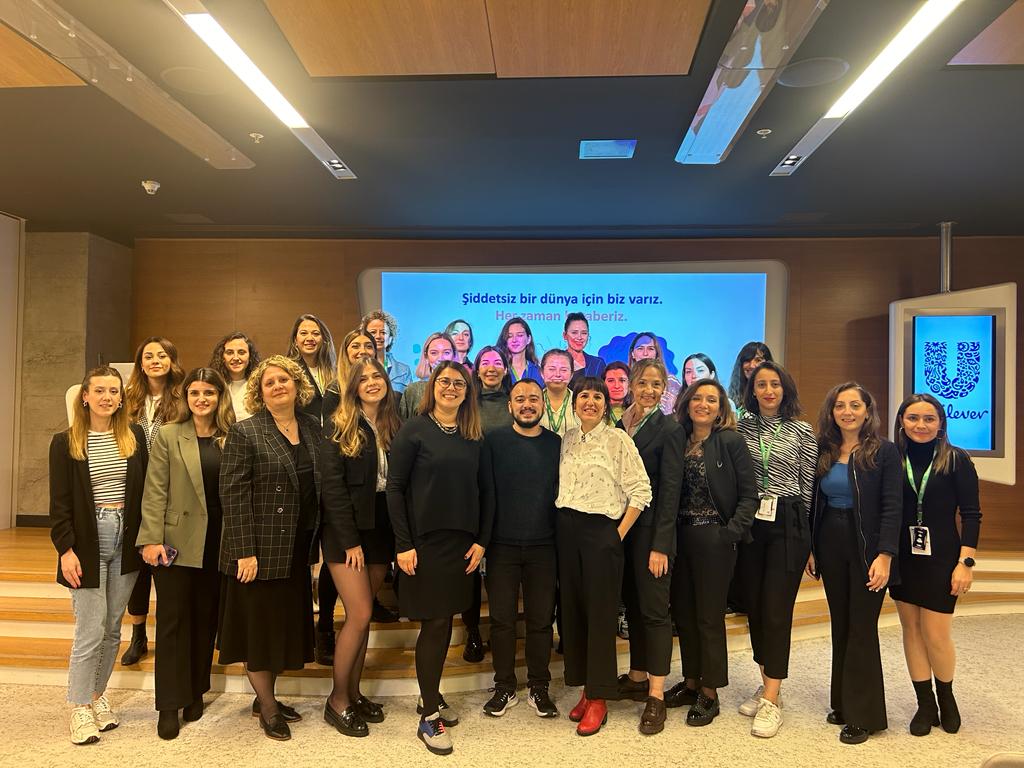The Third Visit of the BADV Network Company Visits Series Took Place at Unilever
On November 13th, Unilever hosted the third leg of the Company Visits Series where members of the BADV Network shared their experiences in achieving gender equality and combating domestic violence.
The event commenced with an opening speech by Mustafa Seçkin, the General Manager of Personal Care for the Middle East and Turkey, and the Country President of Unilever Turkey. Seçkin underscored the importance Unilever places on equality, diversity, and inclusivity, discussing the institutional policies and internal practices they have implemented in areas such as neurocognitive diversity, sexual identity diversity, accessibility, and combating violence. He mentioned Unilever’s commitment to continue collaborating with platforms like BADV to combat all forms of violence.
Following Seçkin’s address, Esen Özdemir, the BADV Project Manager, emphasized the necessity of collective action in combating domestic violence. She highlighted the significance of the BADV Network as a representation of such partnerships in the business world and emphasized that the information and experience sharing during company visits lay the groundwork for this partnership.
Following the opening remarks, Emirhan Deniz Çelebi, the Equality, Diversity, and Inclusion Leader at Unilever, shared insights on the “Equality, Diversity, and Inclusion Agenda for the Business World and Good Practice Examples from Unilever.” Çelebi highlighted that at Unilever, the approach to equality, diversity, and inclusion (ED&I) revolves around two main pillars: “Employee Awareness” and “Working Groups,” which complement each other. He stated that through the Unilever ED&I Champions Academy Program (ULCAP), inspired by transformative learning theory, they aim to cultivate critical thinking among employees, thereby increasing awareness. Additionally, Çelebi shared that the presence of working groups focusing on ED&I topics has successfully elevated ED&I to one of the key themes of the corporate strategy at Unilever.
In the second session titled “Gender and Responsible Media Communication,” Ezgi Tokman Odyakmaz, the Corporate Communications Manager at Unilever, shared insights on how Unilever employs communication strategies that do not perpetuate stereotypes and biases in media representations. Tokman Odyakmaz emphasized Unilever’s commitment to promoting an egalitarian, inclusive, and anti-violence communication approach to catalyze change within the industry. For instance, she highlighted Unilever’s decision not to collaborate with platforms that do not act responsibly regarding violence, a stance supported by their membership in the Unstereotype Alliance Turkey led by UN Women, which has triggered significant changes. During this session, participants had the opportunity to reflect on how brands can engage in responsible media usage through examples of advertisements that prioritize diversity, refrain from perpetuating discrimination and violence, and adopt an inclusive communication language.
The event concluded with a tour of Unilever’s headquarters, designed with an emphasis on accessibility and inclusivity.
The host for the company visits occurring every two months will be Vodafone in January.
